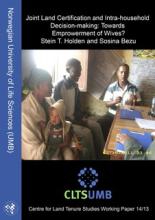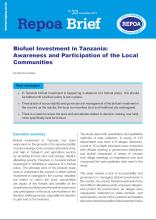Land Library
Bienvenue dans la bibliothèque du Land Portal. Explorez notre vaste collection de ressources en libre accès (plus de 74 000), comprenant des rapports, des articles scientifiques, des articles de recherche, des publications évaluées par des pairs, des documents juridiques, des vidéos et bien plus encore.
/ library resources
Showing items 55 through 63 of 71.This study finds that female-headed households have 23% smaller owned landholdings and 54% smaller operational landholdings.
This paper is about land tenure relations among the matrilineal and patrilineal cultures in Malawi. Data from the National Agricultural and Livestock Census are used to characterize marriage systems and settlement and landholding patterns for local communities.
We have used gender-disaggregated household panel data from 2007 and 2012 in combination with dictator games and hawk-dove games to assess the effects of joint land certification of husbands and wives on wives’ involvement in land-related decisions within households.
The study uses five rounds of household panel data from Tigray, Ethiopia, collected in the period 1998–2010 to assess the impacts of a land registration and certification program that aimed to strengthen tenure security and how it has contributed to increased food availability and thus food secur
Ethiopia has implemented one of the largest, fastest and cheapest land registration and certification reforms in Africa.
This article provides a review of the past and potential future roles of land tenure reforms and land markets in Sub-Saharan Africa (SSA) as responses to population growth in the process of land use intensification and livelihood transformation.
This paper analyses the impact of a low cost and restricted rights land certification program on the productivity of female-headed households. The analysis is based on plot level panel data from the East Gojjam and South Wollo Zones in the Amhara region of Ethiopia.
The study reveals a lack of accountability and governance in managing biofuel investments in the country. As a result, biofuel investments have done little to alleviate poverty, empower villagers, and protect the environment.









